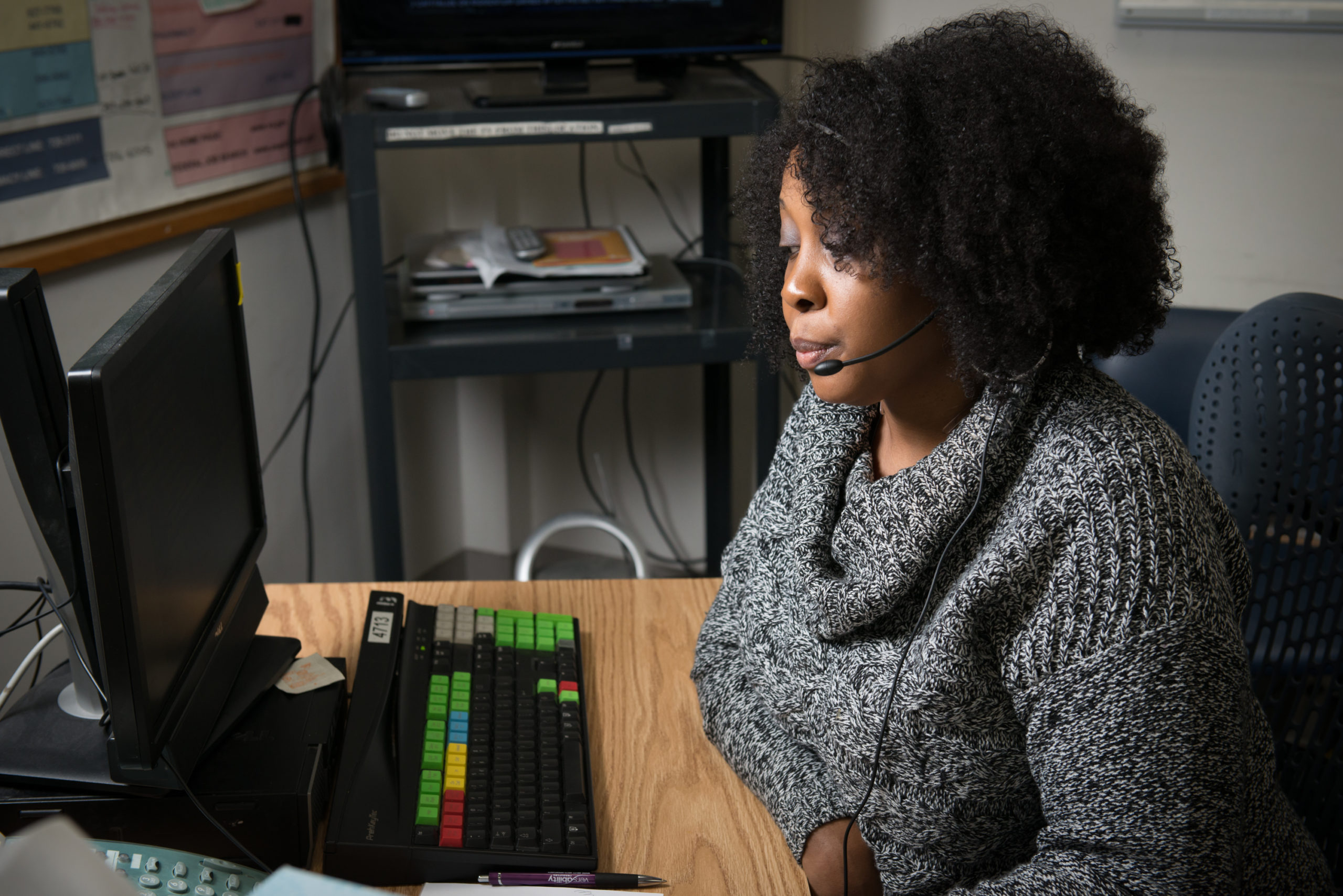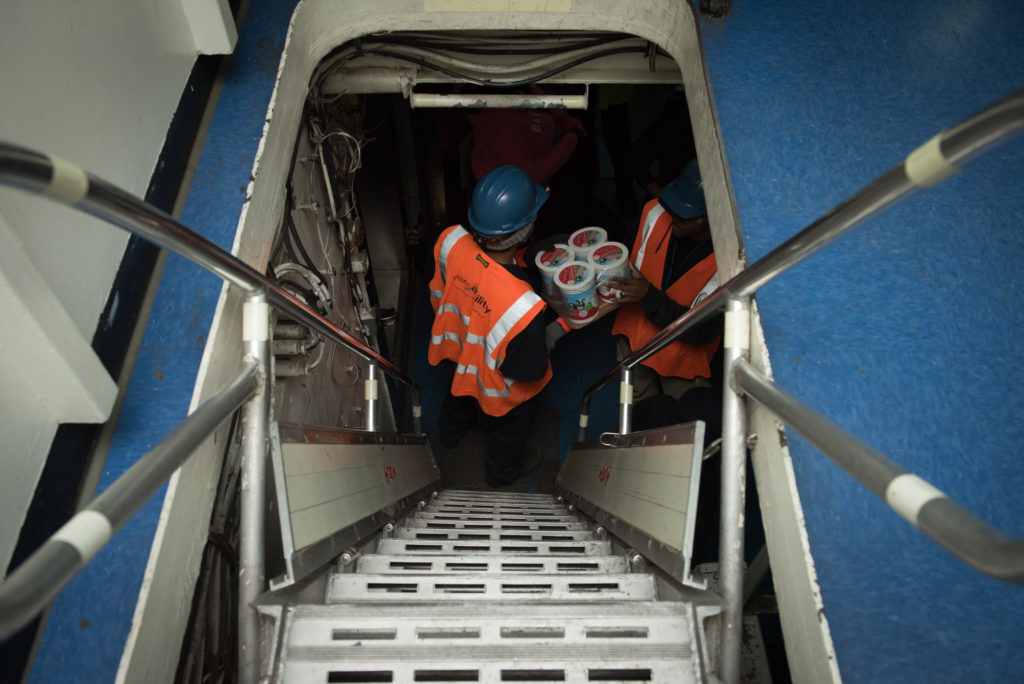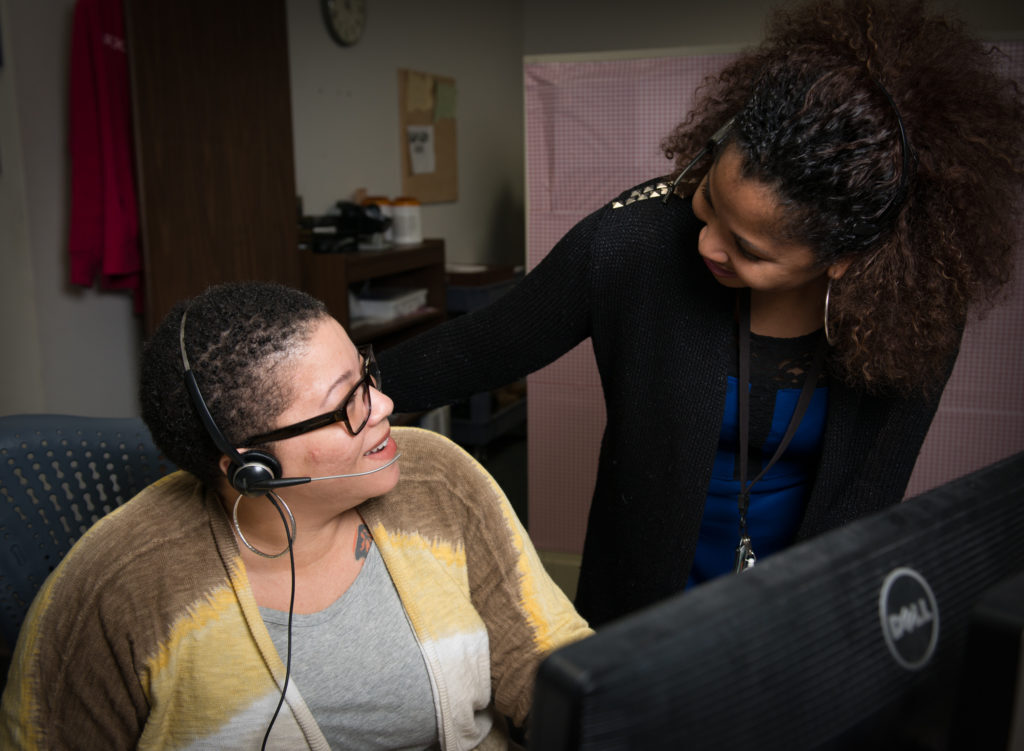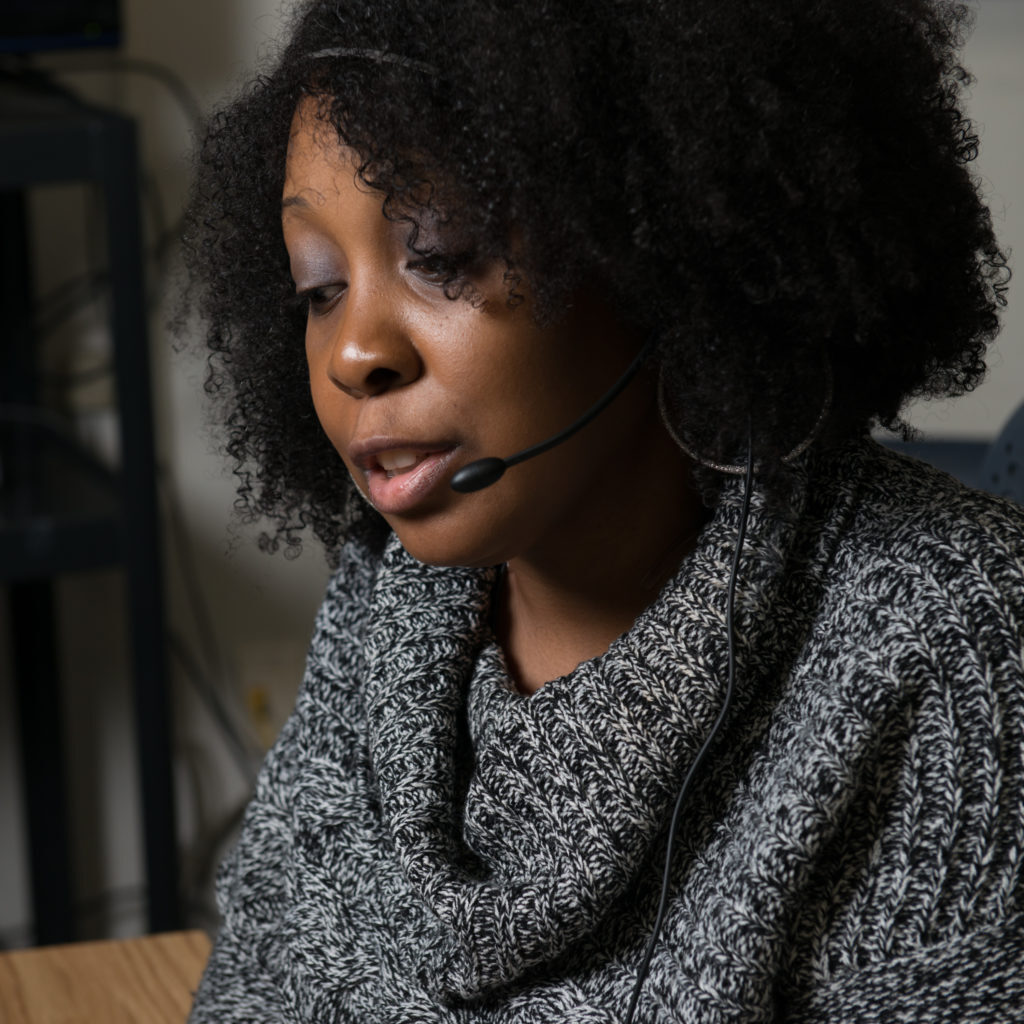Defining “Mission Essential” Thanks to VersAbility Resources

Makya Stallings, Danny Giles and Tracey Cheeks didn’t just find jobs through VersAbility Resources. They found careers as Mission Essential employees at Joint Base Langley-Eustis, where they are call center operators who combine to handle as many as 100 calls a day during busy times.
VersAbility is a leader in federal contracting for people with disabilities. Giles, Stallings and Cheeks work on Langley Air Force Base.
No two days are alike. They make sure outside calls are connected correctly. Sometimes they set up conference calls. Often, the voice on the other end of the line is that of a deployed service member trying to connect to family. Frequently, callers don’t know exactly who they need to be connected to. Stallings, Giles and Cheeks work diligently to help them figure it out.
“All my employees make sure our military is connected 24 hours a day, seven days a week,” said Jocelyn Garrett, Manager at Joint Base Langley-Eustis. “During COVID, we had a lot of people call here wanting to check on their family and we made sure they get connected. We work as a team.”

A first job
Makya Stallings never held a job prior to being hired at Langley. She was born without sight in her left eye and at the age of 13, she lost vision in her right eye. On the job, she relies on what’s called JAWS, Job Access With Speech, a screen reader for computer users whose vision prevents them from seeing the screen.
“I was told I was the first blind person brought to this location,” Stallings said.
The Newport News native started in July 2019, learning the new computer aide along with military vernacular, a language all its own that she speaks with ease now. It’s particularly fulfilling work because she grew up wanting to join the military. Two of her siblings are retired Army veterans, and another is in the Air Force. Her niece joined the Navy, and several of her cousins are service members.
“I’m a people person,” Stallings says. “I like to learn and communicate with different people.”
What she doesn’t enjoy is being categorized because of her disability. Stallings will tell you she’s a Gemini who dotes on her American Pit Bull Terrier, Gideon. She’s a songbird who uses her voice to lift others, and in her free time, she unwinds by ice skating.
“I’m my own person and I beat to my own drum,” Stallings says. “There’s nothing different about me except for the fact that you can open your eyes and look at your face and I cannot.”
Stallings trains other blind and visually impaired hires at the base. She’s happy to do it because she knows the value of having a job to call your very own. “A lot of us want to work but don’t have the courage to get out there and do it,” she says. “I just try to use myself to motivate the next person.”
At the height of the pandemic, Stallings reported to work despite having to rely on public transportation to do so. “I got exposed to the virus three or four different times and had to be tested,” she says.
Stallings lost her grandmother to the virus, also. “That was one of the hardest things my family and me had to deal with because she’s someone who was always there for us, and we couldn’t be there for her.”
If Stallings needs support at work, she finds it in the team around her. “We definitely help each other out,” she says. “No one watches anybody fall short.”
On the busiest days, calls are back to back to back to back. “Take a breath,” Stallings will remind herself before picking up another line. She works weekends and even double shifts when necessary.
“There’s not a day when we’re not open,” she says. “We’re always here when they need us.”

A military connection
Danny Giles’ heavy military background made him a natural to work at Langley, where he is lead operator on weekdays.
Both of his grandfathers fought in World War II, and his father and sister are retired Air Force. His nephew joined the Air Force five years ago.
In addition to answering and connecting calls, Giles tracks calls on the other 12 bases that Langley hosts and submits hourly reports. If too many calls are dropped, that requires action.
“I like talking to people and helping them out in situations,” he says. “I try to connect them to the place they’re looking for and get them the best possible answer as I can without having to say, ‘I don’t know.’”
During the height of the pandemic, fewer people were on base, meaning calls typically placed from offices there were initiated at home.
“They had to rely on us to make sure we could get them to all the places they needed,” Giles says. “If anything happens, we would pretty much be the first ones to know. It could be at any point of the day or night. It’s a good job. It can be stressful, but at the same time it’s fun and you learn new stuff every day.”
The promotion to lead operator is recent and appreciated. He’s worked on base for five years.
“I like challenges,” says Giles, a photographer on the side who shoots wedding and graduation pictures regularly. “When I was promoted, I was pretty excited about it. I like doing something new and having more responsibility. I’m always looking for new adventures.”

“It’s an honor to work on a military base”
Tracey Cheeks moved to Virginia from Baltimore to help her sister through some medical problems. She expected to stay a month. The pandemic altered that, and Norfolk is her new home.
Back-to-back strokes limit full use of her hands, and lymphedema affects her legs, which makes it hard for her to stand for long periods.
The 56-year-old grandmother has held administrative jobs most of her life, working for the Department of Social Services in Baltimore County, the State Highway Administration in Maryland and the Maryland Department of Transportation.
She was hired in Chesapeake but laid off after three months due to the pandemic.
“I wanted to work; I didn’t want to stay home and do nothing,” she says. “I tell people that I might have a disability, but I can still work. My mind is still here.”
A Richmond staffing firm directed her to VersAbility.
“It was like a dream come true,” Stallings says. She jumped at the chance to work at Langley Air Force Base. “I thought it was going to be a breeze,” she admits. “Now it wasn’t as breezy as I thought! It took time to learn, but I’m someone who writes it down and studies it.”
Stallings brought her notes home at night and learned from the example her peers set.
“I wanted to be good,” she says. “I wanted to know everything there is.”
She refuses to let anything associated with her disability limit her.
“Here I work with people with all different types of disabilities,” she says. “It gives me a lot of push and makes you say, ‘I can do that.’ The people I’ve met here who have a disability amaze me and push me to want to do better.”
Cheeks commutes to and from work using Handi-Ride, Hampton Roads Transportation’s Paratransit service. It’s not unusual for her to leave for work two hours early due to unpredictable tunnel traffic.
“I am never late,” she says.
Cheeks’ brother-in-law served as a Marine for more than 26 years. She used to visit the base prior to working on it. As a young adult, she even considered joining the service.
“It is an honor to work on a military base,” she says. “I love it. The people are great here. I feel good when I come here. I look forward every day to come to work. If you enjoy your job, you stay at it and do your best. And I like it here. A lot.”

